Gartner Magic Quadrant for Lead Management Review
CMS-Connected Media Corp. is pleased to bring you exclusive coverage of the Gartner Magic Quadrant for CRM Lead Management 2019. As with our previous Gartner review submissions, our write-ups feature exclusive interviews with comments directly from the vendors represented in the Gartner MQ. Our coverage examines the vendors, their strengths and cautions, and makes sense of the dots within the borders the Gartner quadrant.
Click here to download a copy of the Gartner Magic Quadrant for CRM Lead Management.
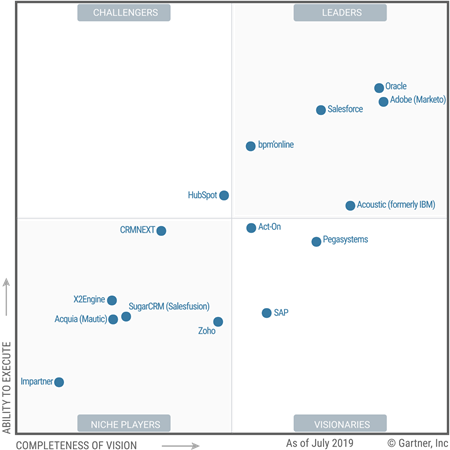
From marketers to salespeople, the importance of generating leads is something universally agreed upon by all departments of an organization. Lead management solutions are essential tools, enabling both the marketing and sales segments to work cooperatively towards the common goal of acquiring new customers.
Gartner’s definition of CRM lead management is “the process of capturing leads, tracking their activities and behavior, qualifying them, giving them constant attention to make them sales-ready, and then passing them on to the sales team.” Moreover, Gartner mentions CRM Lead Management solutions should provide the following features:
- Multichannel lead management
- Lead aggregation
- Lead augmentation and deduplication
- Lead process management
- Lead nurturing
- Lead scoring and qualification
- Analytics and measurements
- Integration with other applications
This year’s Magic Quadrant for CRM Lead Management was authored by Gartner's Ilona Hansen, Julian Poulter, Noah Elkin, and Christy Ferguson. The report focuses on informing and guiding business leaders in the selection process for a CRD Lead Management platform by relying on Gartner’s careful evaluation and judgments. Here are this year’s Gartner selected CRM Lead Management platform providers with a summary of their strengths and cautions.
Leaders (Oracle, Adobe (Marketo), Salesforce, Creatio (bpm’online), Acoustic (IBM))
Oracle finds itself in the Leader position yet again, thanks to its data management capabilities, ABM functionality, scalability, and robust lead management capabilities. Customers, however, found some features of the Eloqua unnecessarily complicated and didn’t seem too happy with overall costs.
Interviewee: Andrea Tucker, Director of Product Marketing
What is Oracle doing to retain its coveted Leader placement?
"Oracle is focused on not only innovating our solutions with forward-thinking features and functionality, but also providing solutions that are easier to use, provide more insight, and create a better experience for our customers and theirs. We are heavily invested in making those experiences faster, frictionless, and more precise leveraging the most relevant data so organizations can increase their speed to lead, and lead to sale — ultimately bringing in more revenue. It may sound old fashioned and basic in today’s fast and ever-changing business world, but the more successful our customers are, the more successful we are. We believe our customers see our commitment to their success and recognize that (and believe that industry analysts like Gartner have recognized that as well)."
What are some of the features that you feel differentiate Oracle from its competitors when it comes to CRM Lead Management?
"Oracle’s 'data first' approach is one of our biggest differentiators from our competitors. It may seem obvious, but companies cannot deliver a differentiating customer experience at the very moment they need it without having a solid understanding of who that customer is and what they are looking for. Because of this, we believe that data is the most fundamental ingredient to success, and so, brands must be thinking “data-first.” Without a solid data foundation, it’s just not possible to deliver an experience that is relevant, timely, and consistent.
And at Oracle, that’s what we do. We started as a database company and had our roots in data for over 40 years. As data is the foundation of any modern marketing lead management program, we decided to double down on our investments in data and today we have the most comprehensive set of data assets that make it easy for our customers to collect their data, put it to work, use it for audience segmentation and targeting, to run experiments, and use it for personalization and recommendations.
Our approach to intelligence and AI is actually much different from those of our competitors. We believe intelligence must be purpose-built and fully integrated to drive business value. Instead of providing a broad independent AI solution that requires heavy investment for implementation, tuning, and ongoing maintenance, we focus on embedding intelligence capabilities within each functional solution to help augment user skills and provide deeper, more personalized experiences for customers, at scale, in real-time, and for real use cases.
Another area of continued focus is our belief that the customer is now in control, and so, intelligent orchestration is necessary to deliver an experience to them reliably and at scale, in each interaction – whether at the individual or account level. In the experience economy, the customer experience is the new battlefront, and those companies who are maniacal about EVERY interaction are at the forefront of the Experience Economy.
Additionally, our platform extensibility and 1st class integrations provide our customers with increased flexibility to help make those interactions a reality. We believe integrations across all customer experience applications (Marketing, Sales, Service) amplify value, ensuring that relevant data flows freely and speedily between related platforms, enabling deeper insights, better ‘decisioning’, and communications that drive sales. We integrate across all CX products creating a true platform where all pieces stitch together and work beautifully."
What can we expect to see next from Oracle when it comes to lead management capabilities?
"We have some very exciting new innovations and features coming – some of which we’ll be highlighted at our Modern Customer Experience conference, part of the Oracle’s Modern Business Experience, March 23-26, 2020, in Chicago [Rescheduled for September 21st – 24th in Las Vegas, NV.]. The following are some of the new features we feel will greatly enhance our lead management capabilities for B2B marketers:
-
Oracle continues to embed practical use of machine learning and intelligence into our platform such as subject line optimization and send-time optimization with models trained to continuously learn against historical data to provide insight on what subjects may be more intriguing to buyers and when they most likely will engage. We are also conceptualizing a new predictive scoring engine, complementary to our current, robust, rule-based scoring. This engine will be self-learning – freeing the marketer from setting rules or creating multiple models for different parts of the business.
-
In addition, Oracle continues to focus on new ways to help customers leapfrog ahead with technology that supports emerging business models. One such example is our new Digital Sales Solution, which was announced in November 2019. This solution is purpose-built to help inside sellers work more quickly and efficiently through leads — converting them at a much higher velocity. It blends core information from marketing-generated leads and presents them in a redesigned easy to use UI that’s tailored to give reps all the context they need (including past engagement with marketing email templates and sales outreach) to convert more leads, faster.
-
To further support our customers’ account-based marketing strategies, we are developing an account level profile view of buyers that will provide powerful insight by surfacing behavioral activity for known account contacts and anonymous account visitors. Along with this will be a new engagement activity dashboard to easily visualize the aggregated engagement of accounts and identify those most active for better targeting.
-
Finally, extensibility to other Oracle products will continue to benefit the lead management process with the recent Oracle Infinity integration for enhanced behavioral tracking, segmentation and analytics to enable sophisticated retargeting use cases; Oracle DataFox integration for the enrichment of contacts with Datafox’s account data; and a deeper integration with Oracle CX Content including the ability to make content decisions based on contact data and engagement."
What do you think is an important feature any lead management application needs to have in 2020?
"At Oracle, we see the most important feature needed is the ability to integrate and leverage the high-quality, real-time data of a customer’s choice for use in lead scoring and management, so sales reps have the most up-to-date information to help understand the next best action and use smart talking points based on market conditions to close sales. It’s one thing to have the data, it’s quite another to allow it to be consistent and accessible to all involved and leverage it to have better conversations — at the right moment — with the right person or account. At Oracle, we can get leads from Marketing to Sales in minutes (sometimes even seconds versus the hours it can take our competitors) based on our ability to process large amounts of data and connect to more than one CRM with our first-class integrations.
So, when it comes to relying on accurate, comprehensive and secure data to help better understand customers and nurture them from a prospect — to a lead — and finally a sale, we believe no one is better positioned than Oracle to help create a frictionless, unified experience necessary to win in today’s Experience Economy."
Adobe’ Marketo continues to hold a leadership position thanks to its trusted, reliable platform, great customer support, and a marketing-focused roadmap. On the flip side, the vendor seems to get criticism on the system’s steep learning curve, rigid data management models, and high costs according to their customers.
Interviewee: Brian Glover, Director of Product Marketing
What is Adobe doing to retain its coveted placement?
"Adobe is maintaining its laser focus on the needs of the marketer, delivering a reliable product that addresses customer needs now and, in the future, as well as providing the services and support customers need to be successful through each step of their digital marketing journey.
Today’s buyers expect deeply personalized and consistent experiences across every touchpoint in their journey. Adobe is heavily invested in innovation that brings together products, integrations, and services that simplify the challenges brands encounter, delivering exceptional customer experiences at scale."
How has Adobe’s acquisition of Marketo helped strengthen or enhance its offering in the lead management sector?
"By adding Marketo Engage to Adobe Experience Cloud, Adobe is uniquely positioned to orchestrate personalized experiences for consumers and businesses at every interaction in the customer lifecycle to drive awareness, consideration, purchases, adoption, and loyalty. The combination of Marketo Engage’s strength in end-to-end lead management processes and engagement with Adobe Experience Cloud’s market-leading content, personalization, AI, and data management capabilities is a win for customers that want to compete through experience."
What are some of the features that differentiate Adobe from its competitors?
"Customers praise the ability of Marketo Engage to help them get to market faster with every experience, campaign, or initiative. Marketo Engage has a unique combination of capabilities to help marketers ramp up and execute quickly while still giving them the depth and flexibility to create experiences that set them apart from the competition. Some examples include AI-driven content personalization, a flexible data model with a broad array of real-time event triggers, a suite of capabilities for creating account-based experiences, and attribution analytics that cover every touchpoint — from ads, web visits and campaigns to sales calls, sales emails and more."
What can we expect to see from Adobe in the next year when it comes to lead management capabilities?
"You can expect to see us continue to invest in leveraging data and artificial intelligence to empower marketers and sales teams to deliver the highly coordinated and personalized experiences customers expect across any channel."
What do you think is an important feature any lead management application needs to have in 2020?
"Lead management has matured quite a bit over the years, and today its less about any particular feature and more about having the right set of capabilities to support an end-to-end lead management process from first-touch to raving customer. Savvy marketers are going beyond the process itself and focusing on the experience they create for individuals and the buying teams within high-value accounts. For these marketing teams, sales alignment has evolved to sales partnerships, and they want tools that support shared data and workflows across teams.
But if there is a feature that stands out, it’s complete attribution reporting. We’re living in the age of analytics, yet many marketers are still struggling to shine a light into the blind spots. We’re now able to know how every campaign, every content asset, every touchpoint impacts pipeline and revenue. There’s no need to wonder which half of your marketing dollars are working when you have the insights to make every dollar matter."
While maintaining their Leader position, Salesforce managed to advance in the Quadrant this year in part thanks to their Pardot solutions and its great functionality capabilities, ease of use, and focus on productivity. It seems customers wished for more unified native ABM capabilities, better prices, and well-rounded reporting capabilities.
Interviewee: Nate Skinner, VP of Product Marketing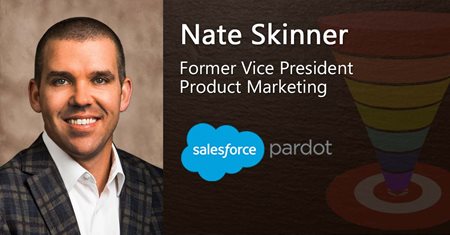
What features and functionalities helped Salesforce progress within the Leaders’ quadrant?
"Salesforce customer success platform enables organizations to gain a single view of their customers (Salesforce customer 360) and helps put their customers at the center of everything they do. With this unified view, organizations can know their customers, and truly offer them a continuous, personalized experience across all touchpoints — marketing, sales, and service.
What makes Salesforce unique is the ability to support marketing, sales, and service teams on a single platform. The fact that Salesforce for B2B Marketing is the only solution built on the world's #1 CRM that aligns marketing and sales teams to generate more pipeline, empower sales to close more deals, and grow customer relationships at scale played a key role in its progress within the Leader’s Quadrant. Along with this, innovation that Salesforce has brought to market through Marketing Analytics to help marketers understand and improve marketing ROI, Artificial Intelligence to unlock the next level of productivity and effectiveness, and Account-based Marketing (ABM) to target and grow key accounts are also important factors in Salesforce’s progress within the Leader’s Quadrant."
What are some of the features that you feel differentiate Salesforce from its competitors when it comes to CRM Lead Management?
"Our powerful Customer 360 platform enables our customers to align their efforts across marketing, sales, and service so that they’re interacting with customers in the most relevant way. For example, by ensuring teams are aligned, and silos are broken down, a marketer can see what support tickets a customer has open before reaching out to upsell or cross-sell. These insights can ensure that the customer receives the most personalized touchpoints.
It’s also critical that AI is not isolated but built within the platform so marketers can take actions and scale with AI. Salesforce for B2B Marketing’s AI capabilities enables marketers to understand when prospects are ready to buy, target leads who are most likely to become customers, as well as maximize campaign effectiveness in real-time. Out-of-the-box analytics dashboards help understand and improve marketing ROI. ABM helps marketers identify key accounts by accessing all account data and align revenue teams to execute on connected cross channel engagement and help close bigger deals."
What new capabilities can we expect to see from Salesforce in the upcoming year?
"We will continue to weave AI, Analytics, and ABM capabilities together to ensure marketers can take more intelligent actions at scale and understand what is happening with their business. Additionally, we are always thinking of how to increase productivity and make marketing teams more efficient — you’ll see improvements to our email builder and UI to simplify and improve the experience for marketers."
What does Salesforce think is an important feature any lead management application needs to have in 2020?
"Marketers are inundated with so many tools; it’s not necessarily about having the newest tool or feature. It is critical to have a platform that gives you a single view of the customer into everything across marketing, sales, and service. That visibility, combined with artificial intelligence and analytics, will allow marketers to drive engagement as well as orchestrate broad-based and account-specific strategies in a way that’s never been possible before."
The vendor made its way to the Leader quadrant thanks to its strength in lead management capabilities, great marketing, and sales strategy, and a strong GDPR compliance. The report indicated that the vendor needs to work on expanding its customer assistance support to match their increasingly global clientele, improve their ABM functionalities, and its implementation of services.
Interviewee: Katherine Kostereva, CEO, and Managing Partner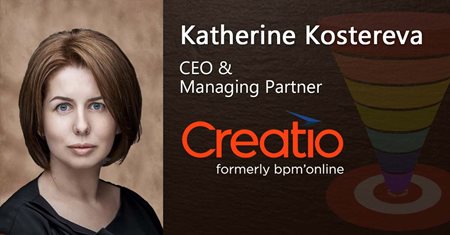
Creatio (formerly bpm’online) moved into the much-coveted Leader quadrant this year. Well done!
"We are honored to be recognized as a leader in the industry, along with some other big names. It is great to see that our software has been recognized by such a respected analyst like Gartner. It really means a lot to us, and we’ll work hard to hold a leading position in the industry in the future.
What did Creatio do to earn their Leader placement?
"Creatio (formerly bpm’online) was recognized as a niche player three years ago and moved from the Challenger’s Quadrant in 2018 to the Leader’s Quadrant in 2019. We believe we’ve improved year over year by always putting our customers and their needs first. Being obsessed with our customers’ success, we continuously improve our software and its ability to empower organizations to automate processes and help companies accelerate.
Ensuring our customers are happy plays a huge role in maintaining our leading platform in addition to improving our competitive position within the industry."
What lead management capabilities differentiate Creatio from its competitors?
"Marketing Creatio helps organizations orchestrate customer journeys and accelerate lead-to-revenue. The product comes with best practice processes for efficient lead management — from demand generation, lead nurturing, and lead scoring to final hand-off to sales. Our primary task is ensuring companies focus on qualified and sales-ready leads only.
The backbone of our software and a key differentiator is its business process management engine. Another strength is our suite. Marketing Creatio can be either used separately or coupled with Sales Creatio and Service Creatio, built on one low-code process management platform. We also have a marketplace of apps, connectors, and templates to expand the capabilities of the software further.
Depending on the business’s needs — together with our partners — we can offer tools that will meet the requirements of a particular organization best."
What can we expect to see from Creatio in the upcoming year?
"We will be improving our products further to help companies accelerate. Recently, we’ve focused on extending the low-code and process automation capabilities of our platform. In the upcoming year, we will continue to work towards the goal of making the job of marketers easier and more data-driven. You can expect to see us extending and enhancing the software and its customizability to empower organizations and their employees. For example, extending predictive intelligence and low-code/no-code tools to ensure our solution can address more business needs with little to no coding required, and expanding mobile app capabilities so users can work with the platform on the go easier."
What do you think is an important feature any lead management application needs to have in 2020?
"According to Gartner, ‘Good lead management is about better cooperation between sales and marketing to increase the supply of potential customers and boost total sales conversion.’ I believe lead management apps cannot continue to exist disconnected from the software that supports sales, service, and operations in organizations in 2020. Features of these solutions should contribute to the overall goal of an organization and allow for spotting bottlenecks and potential risks that might occur when leads are being nurtured or qualified. The connectivity of business apps can do this, ensuring that issues are fixed and prevented in a timely manner by increasing cooperation between different departments.
Low-code/no code capabilities will also be very important in 2020. Considering the IT delivery gap and growing backlogs of business apps, patches, upgrades, and customizations that various departments have in the queue for developers, 2020 definitely a year to take a closer look at the software capable of shrinking this gap."
Acoustic is taking IBM’s spot in the Leader quadrant, offering a “robust multichannel lead management capabilities”, robust compliance support with GDPR, LGPD and CCPA, and excellent reporting and analysis features. The report suggests Acoustic is less than stelar when it comes to its lead augmentation, deduplication and predictive lead scoring capabilities and lacks ABM modules.
Jay Henderson, Senior Vice President of Product Management
Acoustic has entered the Magic Quadrant as an offering independent of the former IBM Watson Marketing brand. What does this transition mean for Acoustic and its clients?
"This transition brings even more benefits and opportunities to Acoustic clients now that we’re a platform that’s entirely focused on the needs of the modern marketer.
The separation from IBM has allowed Acoustic to be more nimble and responsive to industry changes and has prevented the brand from being weighed down by a large corporate structure — both which enable us to listen to marketers’ biggest challenges and always put our clients first. This organizational agility, combined with the investment from Centerbridge, also brings our clients product innovations (and measurable results) more quickly.
Additionally, Acoustic’s experienced executive team has been running the business for years, making the transition frictionless for clients. Since Acoustic became an independent company, clients and partners have even more opportunities to meet with our experts often thanks to more user groups, revamped customer communities, and even a new annual summit that will be unveiled in 2020."
What functionalities and capabilities make Acoustic stand out from the rest of the Leader quadrant?
"Gartner’s analysis highlighted three of Acoustic’s core strengths that set us apart from the rest of the quadrant: lead process management, compliance support, and reporting and analytics. Acoustic’s ability to provide clients with seamless workflow creation based on real-time behavior tracking, commitment to compliance support around local and global data privacy laws, and effective reporting and analytics offerings all qualified the brand as a Leader and are things we’ve developed with specific feedback from marketers in mind.
In addition to Gartner’s key findings, our clients rely on us because of Acoustic’s total focus on the marketer and open-platform ecosystem. Acoustic is led and built by a team of marketers, so we understand marketers and their need for connected solutions and results-driven tools that prioritize privacy and maximize revenue and customer satisfaction. In addition, our one-of-a-kind open ecosystem encourages collaboration across teams and vendors by using advanced technology to analyze big data and automate routine tasks, freeing up marketers' time to be creative."
Acoustic’s roadmap scored the highest amongst all vendors evaluated. Can you elaborate on that, and what will be coming down the pike for Acoustic in the upcoming year?
"Since launching in July 2019, we have delivered enhancements to our purpose-built solutions, such as Salesforce Lightning Support general availability, Anomaly Detection, and Message Composer. Anomaly detection identifies unexpected trends, behaviors, and events, as well as probable causes in outbound campaigns, and proactively alerts users to review and take action, while Message Composer saves users significant time creating content across channels and includes an AI-powered content library. And these enhancements are just the tip of the iceberg.
As we move into the New Year, we are excited about the investment being poured into our products. We are working on making sure that we provide marketers AI that’s more than a buzzword, a platform that’s open and cleverly connected to the rest of the marketing stack, a modern architecture built on cloud-native microservices, and a platform where privacy isn’t an afterthought."
What do you think is an important feature any lead management application needs to have in 2020?
"The lead management applications that poised for success in the future will be the ones that put privacy and ethics at the core of their models.
At Acoustic, we built our platform around privacy instead of bolting it on as an afterthought because we believe all marketers should prioritize a new quadruple bottom line: environmental, social, governance, and data. MarTech and AdTech vendors need to develop applications that help safeguard consumers in a world where privacy is for sale by empowering them to take control over how their data is used and sold. This essential process begins at the core of product development, not as an afterthought added as a cherry on top.
Additionally, ensuring that AI-driven lead management tools are built without bias is critical. Marketers in 2020 and beyond need to keep this technology in check by championing transparency, adhering to an ethical code of conduct, and building safeguards into AI-powered solutions from the very beginning. Reducing AI bias will require a great deal of expertise and dedication, but if AI teams remain alert to potential biases and ensure diversity in all training samples and data collection, non-biased AI will eventually become a reality. "
Challengers (Hubspot)
Hubspot made a move from Niche Players to Challengers this year with the report attributing the upwards move to their execution, platform ease of use, speedy deployment, and great use of the freemium model. Hubspot’s limited product vision, blindspots where it comes to third-party integrations, and below-average ABM functionality are listed as cautions.
CMS-Connected was unable to schedule an interview with Hubspot in time for our article publication but hope to include their insights in future updates.
Visionaries (Act-On, Pegasystems, SAP)
Still positioned in the Visionary quadrant, Act-On gets praised for its market understanding and sales strategy, its new Accelerate package, and improvements to its UI environment. The report expresses slight disappointments with regard to the lack of AI and ML in the vendor’s offerings, as it does regarding their somewhat limited scalability and functionality, and a lack of applications marketplace.
Interviewee: David Greenberg, SVP of Marketing
What features and functionalities helped Act-On secure a Visionary placement for another year?
- "Marketing-as-a-Service (Act-On Accelerate): Our new comprehensive solution that bundles the Act-On platform with vital marketing strategies and execution for sustained success.
- CRM open ecosystem: With more native CRM integrations than any other industry leader in our space, we focus on a best-of-breed and open-ecosystem approach that empowers customers to build a marketing technology stack best suited for their business.
- Adaptive Web: This new website plugin provides intelligent, AI-driven content recommendations that adapt to each website visitor’s behaviors and engagement patterns, on all marketing channels and user devices."
In your opinion, what makes Act-On stand out from the competition?
- "Act-On has an open-ecosystem approach, especially when it comes to the most important integration — the CRM. For example, Act-On maintains five native bi-directional CRM integrations while most others average just one or at most two, thereby limiting marketer's options and pressuring vendor lock.
- Act-On's Accelerate solution is the first offering to incorporate a holistic set of services, including strategy guidance, execution assistance, custom KPI analysis (including deliverability reporting), and systems integration help (custom bi-directional mappings, etc.). This offering helps customers optimally strategize and meet their purposeful goals using this marketing technology. We consider ourselves a partner in marketing, not just a technology vendor, and recognize marketing automation is a powerful tool that goes far beyond platform functionality. Marketing automation is a core part of a business engine and requires foundational strategy and intent to be most successful — we at Act-On are dedicated to helping our customers achieve this with Act-On Accelerate.
-
Act-On is designed for any marketer to be able to use the powerful platform while leveraging AI to turn data into engagement insights and automate behavior-based actions. We deliver a platform that has robust capabilities, yet offers the fastest time-to-value because our customers have industry-leading support with effective, efficient, and intuitive onboarding.
-
Act-On offers a value-based pricing model — i.e., not based on the size of a customer's contact database but rather based on actively engaged contacts."
What can we expect to see in the new year from Act-On?
-
"Act-On will be doubling down on user experience improvements within the platform, which include an updated UI and reporting functionalities, new list management and organizational features, and enhanced autosave functionality to protect user work.
-
Act-On is deepening our integrations and increasing our integrations library, strengthening our open-ecosystem approach so customers can optimize and integrate their marketing technology stack.
-
Act-On is introducing event-based email sending in real-time, which will trigger a personalized email response at a 1:1 ratio when the website visitor takes a specific action."
Lastly, what do you think is an important feature any lead management application needs to have in 2020?
"Designing an end-to-end user experience must be the driving priority for any lead management application. Ease of use is essential, from supporting integrations for a truly streamlined marketing/business technology stack, to accessing holistic contact reporting at the click of a button, to providing ample strategy and support for teams of any size to successfully leverage."
Pegasystems stays put in the Visionary quadrant with the report listing their SaaS capabilities, customer support, and cross-enterprise integration as strengths. Their weaknesses include a limited application ecosystem and the requirement for highly skilled resources to deploy their solutions.
CMS-Connected was unable to schedule an interview with Pegasystems in time for our article publication but hope to include their insights in future updates.
SAP jumped from the Niche Player corner into the Visionary one this year. The report attributes the move to SAP’s “strong market understanding and market strategy.” The vendor has solid AI/Ml models, good GDPR compliances, and well-rated overall processes, especially when it came to their CRM. The vendor is not as well-developed in its email functions, market recognition, and customers don’t seem to think the overall lead management experience was as good as it could be.
CMS-Connected was unable to schedule an interview with SAP in time for our article publication but hope to include their insights in future updates.
Niche Players (CRMNEXT, X2Engine, SugarCRM, Zoho, Acquia (Mautic), Impartner)
Despite being in the Niche Player quadrant once again this year, CRMNEXT’s position has improved. The report recognizes its complex lead management workflows, its flexible cloud deployment, and chatbot services. The vendor does have a limited ecosystem and geographic focus, which are listed as cautions in the report.
Interviewee: Joe Salesky, CEO
What did CRMNEXT do to improve its position in the quadrant as compared to last year?
"CRMNEXT has launched innovative capabilities in the area of chatbots and natural language processing with its BOTNEXT and DATANEXT solutions. This has helped to significantly improve customer experience and engagement with real-time decisions."
What features and functionalities differentiate CRMNEXT from its competition?
"The depth and scope of CRMNEXT’s workflow and integration designers; the platform’s scalability and complex workflow handling capabilities, specifically in large banking, financial services, and insurance implementations; its flexible cloud deployment and intelligent 360-degree customer action centers are some of the key differentiators of the CRMNEXT solution."
What new capabilities can we expect to see from CRMNEXT in the upcoming year?
"The philosophy that drives CRMNEXT’s roadmap is that sales automation will need to be more aware and intelligent by marrying data science, AI, and decisioning to create more autonomous processes and a smarter workforce. CRMNEXT is continuously focused on enhancing its big data and artificial intelligence frameworks to provide faster and effective personalized customer experiences. You will see new real-time integration capabilities with its ‘Real-time Business Fabric’ framework to create intelligent customer engagement hubs."
What does CRMNEXT think is an important feature any lead management application needs to have in 2020?
"In a time where customers have more choice and access to information than ever before, intelligent capabilities for instant response and fulfilment at the point of interaction, at any touchpoint will be critical."
New in the Quadrant, X2Engine gets noticed for an overall unified product offering, strong workflow capabilities, and for offering a postive overall experience to their customers. The report does caution against their poor partner ecosystems, lack of AI capabilities, and its use of an outdated interface.
Interviewee: Dave Buchanan, CEO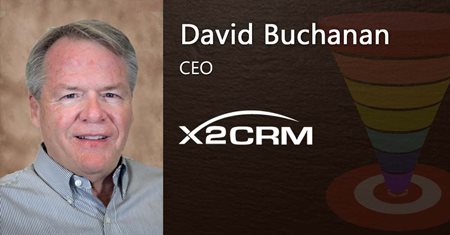
What did X2Engine do get noticed and earn its place on this specific Quadrant?
"X2Engine took the last eight years to build out a robust, enterprise-class CRM with MA functionality completely integrated with the CRM and designed to work together using the same X2 Application Platform. The main advantage of X2 over other software companies that offer both CRM and MA is that most vendors have acquired their MA package and then performed a lightweight integration. X2Engine is unique in its ability to address CRM and MA functionality in a single package with an open architecture to allow customers to easily extend the X2CRM and X2MA applications and to interconnect with a wide variety of other applications from ERP, accounting packages, to AI tools and Data Analytics tools."
What differentiates X2Engine from other lead management vendors? What features and functionalities make it stand out?
"The biggest feature that makes X2Engine stand out is the integrated workflow engine that supports all marketing, sales, and support activities. The workflow engine can quickly develop workflows that do not include any coding to build drip campaigns, control the process and stages of the Lead Management Qualification process to nurture Marketing Qualified Leads, and then a second set of Process Stages and workflows to manage the Sales Process from Sales Qualified Leads to Closed Deals.
Another key capability is that any Module in X2 whether it is a core CRM Module like Leads, Contacts, Accounts, Opportunities, Quotes, etc., or custom added in Modules like Listings, Buyers, Sellers, for a real estate company, all of these Modules can be used for dynamic or state segmentation and these lists can be dropped right into a blast email campaign or a drip-email campaign. This enables sales reps, support reps, and other groups in the company to take full advantage of the MA functionality. MA is not just for the marketing people. A support person can quickly build an email campaign to alert all customers of a specific release level of a product of an issue, or a one-time upgrade credit to encourage customers to upgrade. A salesperson can quickly segment and email to different groups of his customers’ specific price discounts for additional business in a matter of minutes. A support person can quickly build a campaign for customer notices about certain product information or build a drip campaign to check-in with customers on a regular basis to track satisfaction."
What is an important feature that any lead management application needs to have in 2020?
"X2Engine has just introduced an AI chatbot that incorporates natural language processing and machine learning to automate conversations with prospects. This allows companies to standardize the information going out to prospects and automate much of the routine customer interactions to give superior 24x7 access to information and allows companies to build conversation trees that build best practices into customer interactions. AI is going to redefine how companies interact with prospects and customers, and nothing will ever be the same again."
Salesfusion, recently acquired by SugarCRM, stays put in the Niche Player quadrant. Its listed strengths include their strong lead scoring, proper GDPR compliance, and top-notch customer support. They don’t score as high in the lead deduplication department and have limited ABM capabilities and poor integration with third-party applications.
Interviewee: Martin Schneider, Head of Corporate Strategy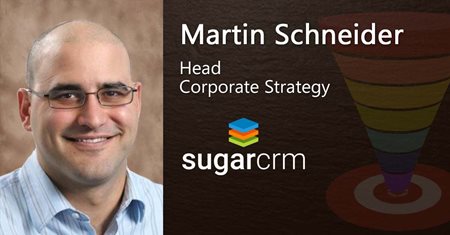
What differentiates SugarCRM’s Salesfusion from the competition? What features and functionalities make it stand out?
"One of the things that make [SugarCRM’s] Sugar Market (formerly Salesfusion) stand out is its ease of use. In addition to efficient and intuitive daily use, the system is very easy to get up and running with a few simple configurations. In fact, we were able to convert the entirety of SugarCRM’s inbound and digital marketing over to Sugar Market in a couple of weeks with no downtime or loss of lead momentum.
Sugar market’s reporting tools are highly insightful and presented in a marketing, user-oriented manner — as opposed to that of a business analyst. We want people to quickly identify trends and ‘a-ha’ moments and take immediate action to improve and optimize their lead funnels and sales pipelines.
Creating highly adaptive, engaging campaigns and programs is simple, as Sugar Market offers a drag and drop, no-code console for building any kind of landing page, submission form, email communication, social post, etc. Whether you are a novice marketer or a savvy designer, Sugar Market allows you to create the right message, on-brand, every time. And, Sugar Market also lets you manage your Google ad words purchases and social media campaigns all from one simple to use user interface.
The deep integration with the sales automation in Sugar Sell is just icing on the cake. Sugar Market and Sell are more tightly integrated than most sales and marketing tools, and that will only continue to improve as Sugar Market evolves as part of the Sugar family. "
What can we expect to see from SugarCRM in the upcoming year?
"We have a lot of big announcements planned, in a lot of different areas. But specific to Sugar Market, we will be releasing capabilities to identify and remove automated form fills or ‘bot’ from your marketing funnel with no effort. This means your marketing and sales teams are more productive since they’ll only be focused on real, interested human beings – and your reporting and metrics will be more accurate as well.
We will be expanding the account-based marketing (ABM) capabilities in Sugar Market as well, allowing companies to focus on the right individuals at the right target companies. In addition, we will be adding multi-touch lead attribution capabilities, which will give marketers and sales professionals invaluable insights into how prospects become customers. We will also be providing advanced lead scoring and predictive insights, leveraging both the complete pipeline capabilities of Market and Sell together, but also through integration with our predictive analytics platform, Sugar Discover.
All this and a lot more are just some of the ways we will continue to innovate around our cloud offerings in 2020 and beyond."
What is an important feature any lead management application needs to have in 2020?
"The ‘table stakes’ for marketing automation these days have become pretty clear: offer solid lead scoring mechanisms, nurture builders, landing page and form builders that are highly intuitive, and help manage all channels of marketing communications (email, social, SMS, web, etc.). In addition, some form of account-based marketing capabilities must be included in any marketing tool worth its salt.
As we enter 2020, more advanced analytics, powered by AI – to find more ideal prospect profiles, multi-touch attribution, and propensity for leads to convert will become more mainstream, as today they are very much “nice to haves” among most marketing organizations."
Zoho is spending another year in the Niche Player corner despite strong lead scoring, a platform rated high for its ease of use, and excellent lead workflows functionalities. The vendor did not score so well with its ABM capabilities or technical support, and the report feels it lacks an overall strong market differentiator.
CMS-Connected was unable to schedule an interview with Zoho in time for our article publication but hope to include their insights in future updates.
Acquired by Acquia, Mautic continues to stay in the Niche Player quadrant for another year. The report points out the platform’s flexibility, privacy tools, and easy deployment as strengths but cautions against their limited self-service support, integration with other sales channels, and issues with the overall product stability.
Interviewee: Steve Schult, VP of Product at Acquia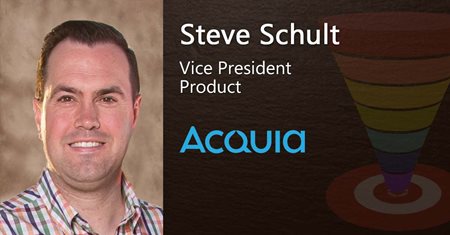
What lead management capabilities and functionalities make Mautic stand out? What does Mautic do best?
"As the world’s first open marketing automation platform, Mautic is different. Its flexible, adaptable platform is built with an open-source philosophy and an API-first architecture. With Mautic, organizations can orchestrate seamless, one-to-one customer experiences across any digital channel, such as web, email, mobile, social media, or emerging channels like voice. Mautic’s platform allows for open innovation and thousands of integrations, making it easy for marketing teams to combine the tools of their choice -- both bought or built -- instead of experiencing vendor and data lock-in.
Mautic’s simple, no code campaign builder enables marketers of all skill levels to quickly and easily create anything from simple email nurture campaigns to complex multichannel campaigns across multiple channels, including website, mobile app, social, and SMS.
Maestro, Mautic’s Marketing Automation Management capability, offers a single location for decentralized teams to build, launch, and iterate on automated campaigns. For organizations with multiple teams, brands, locations, or franchises, Maestro is a differentiator in that it provides insight into how different campaigns are performing and allows for easy duplication of campaigns that smaller or teams can then localize and personalize rather than build from scratch. Maestro uniquely solves the distributed marketing automation problem in a differentiated way from every other lead management solution in the market today."
What will the Acquia-Mautic partnership bring to the lead management space in the upcoming year?
"The addition of Mautic’s marketing automation and campaign management capabilities to Acquia’s Open Digital Experience Platform drives seamless, one-to-one customer experiences across any digital channel. Built on two thriving and well-respected open source communities, Drupal and Mautic, Acquia’s Open Digital Experience Platform lay the foundation for next-generation experiences. In 2020 we’ll integrate our newly acquired customer data platform AgilOne with Mautic, making it easier for marketers to gain a single view of the customer and deliver better, more relevant customer experiences and analytics across channels."
What is an important feature any lead management application needs to have in 2020?
"Today’s marketing and operations teams are siloed and distributed across different regions, brands, and business units. Lead management applications need to have the flexibility to uniquely meet each of these teams’ needs while offering central automation management capabilities. This means the ability to have centralized governance and oversight of multiple instances of marketing automation in a single place, the ability to quickly replicate successful campaigns or campaign assets (email, segment, form, etc.), and the functionality to localize and personalize these campaigns for different brands, languages, and audiences without having to duplicate efforts."
Another year in the Niche Player quadrant, Impartner scores well as providing a positive overall experience, for providing a relatively good customer journey experience and establishing itself in a variety of industries. The vendor does not get the same praise when it comes to their analytics capabilities, WCM integration, and ABM capabilities.
CMS-Connected was unable to schedule an interview with Impartner in time for our article publication but hope to include their insights in future updates.
Final Thoughts
It was interesting to see the changes that happened over the course of one year in the Quadrant — from new entrants to surprising exits, and exciting acquisitions. How will these new partnerships change the landscape of the quadrant in the years to come? With the market constantly evolving, the report points out the trends that continue in influencing it over the past years include the need for collaboration between departments, the need for more robust integration capabilities, the maturing of predictive lead scoring, and lastly, the need for intuitive, easy to use UIs. Recent trends that seem to influence the market include a shift towards CRM integrations, an increased demand for account-based marketing, a need for improved B2B experiences, a better use of AI to help facilitate lead scoring along with interests in sales acceleration solutions, and better data ingestion and storage.

Ellie Somfelean
Ellie is a Reporter and Content Marketer with CMSC Media. She is passionate about social media and digital marketing. She has a vast experience with content creation, influencer marketing and brand promotion.